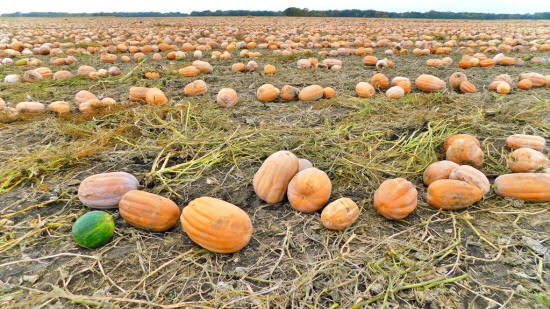|
 Restaurants are serving up
everything from pumpkin cheesecake to pumpkin-flavored ice cream.
And of course, Starbucks fans go crazy over a Pumpkin Spice Latte as
the weather cools off. But the most famous of all pumpkin delights
is without a doubt pumpkin pie. Restaurants are serving up
everything from pumpkin cheesecake to pumpkin-flavored ice cream.
And of course, Starbucks fans go crazy over a Pumpkin Spice Latte as
the weather cools off. But the most famous of all pumpkin delights
is without a doubt pumpkin pie.
Here in central Illinois at the heart of it all is the Nestle/Libby
processing plant in Morton, which happens to be the “Pumpkin Capital
of the World.” Eighty-five percent of the world’s canned pumpkin is
produced in Morton. To be a leader in the world market, Libby’s
contracts out approximately 5,000 acres of central Illinois farmland
dedicated to the specialty crop.
Right here in Logan County one local farmer is getting a “piece of
the pie.” Bill Sahs, who has been farming for 46 years, is just one
of a handful of farmers raising pumpkins for Libby’s. Sahs is
currently seeing the fruits of his labor carted off the farm, as
Libby’s has been busy harvesting the pumpkins and taking them north
to the canning plant in Morton. That canning plant produces Libby’s
Famous Pumpkin Pie, which is one of the most widely recognized
products on the market.
Sahs is in his third year raising pumpkins for Libby’s and it’s
obvious he is enjoying the opportunity to feed the world, all
because a neighbor introduced him to the idea.
“We are talking about pumpkins today because I have a neighbor, Jeff
Elsas, who has a friend that is a salesman who gets customers to
raise pumpkins,” began Sahs, “and he told me about the pumpkins and
the contract and how much money could be made with pumpkins. The
profitability of corn and soybeans was at a low level and the
pumpkins were a lot better, so I decided to try it. This is the
third year that I have raised pumpkins and this year was my best
year. We’ve had almost 30 ton to the acre, which is pretty good for
pumpkins.”
In the beginning there was some risk, as with anything in farming,
but Sahs was up for the new challenge.
“There is risk in anything when you’re trying something new,” said
Sahs. “Anyway, I thought let’s give it a shot. The first year we did
it we were very fortunate we didn’t have any bad weather.” That
first year Libby’s contracted Sahs to plant 80 acres of pumpkins.

That first year was very successful and that led to another year
with Libby’s. Sahs made the necessary adjustments for year two and
put the seeds in the ground.
“You cannot raise pumpkins on the same field two years in a row,”
Sahs explained. “You have to wait three years to grow them on that
same farm again. So you are three years out once you raise them on
that farm. Next year as an example, I can go back to the farm that I
did the first year that I raised them, if I want,” said Sahs. “The
first year I had 80 acres. The second year they had an
over-production and they cut us back to 40 acres. This year we
raised 100 acres. So it keeps fluctuating. We never know. So we have
to keep getting ground approved. They have soil tests they do on the
property to make sure there’s no levels of heptachlor and chemicals
that have a rough half-life, they don’t want that in the pumpkins.
It has to be less than one percent.”
So just how profitable is raising pumpkins compared to other crops?
“I can actually make more money on pumpkins than I can corn and
soybeans,” said Sahs. “The nice part about it is Libby’s furnishes
the seed so there is actually no seed cost. And they also harvest
the pumpkins. Once I get the pumpkins planted and all the fertilizer
on and the field work done, that’s it, I am done.” The rest is up to
Libby’s, who simply show up with a crew without notice and begin
picking the fields clean. “Libby’s hauls it away. “They do
everything,” said Sahs of the work in the fall.
[to top of second column] |
 As far as preparing the
field for the crop in the spring, Sahs is satisfied saying, “It’s no
different than getting the ground ready for corn and soybeans. You
have to fertilize it like you would corn and you have to work the
ground and then you plant the ground. It’s really the same thing.
You use the same planter that you plant corn with.”

This year’s wet spring had
little impact on the crop as well. “We were a little late getting
the crop planted this year, I think about three weeks later than we
did last year,” said Sahs. The dry summer did not hurt the pumpkins
either. “Pumpkins don’t mind hot, dry weather. The same kind of
conditions you like for soybeans, you like for pumpkins. Soybeans
don’t like wet feet and pumpkins don’t either.”

How does Sahs like growing pumpkins compared to other crops? That’s
a good question and he answered honestly, with a smile.
“The problem you have with pumpkins is there’s only one or two
chemicals you can use to control weeds and weeds can be a problem,
but when you get the check in the mail you forget about the weeds,”
he grinned.
“It’s just a neat process and it’s just another means of
diversifying so you can help your bottom line and that’s what
agriculture is about - affecting your bottom line,” concluded Sahs.

The end result for the consumer is one that is most delicious,
especially around Thanksgiving. After the pumpkins leave the field,
Libby’s takes care of the rest and everybody gets to enjoy pumpkin
pie for the holidays.
So the next time you grab that can of Libby’s off the shelf, the
chances are really good that you are supporting a local farmer and
quite possibly that farmer is Bill Sahs.
Libby's Pumpkin Pie
The number one canned puree pumpkin
https://libbyspumpkinpie.com/libbys-pumpkin-story/
|
Read all the articles in our
new
2019
Fall Farm Outlook Magazine
|
|